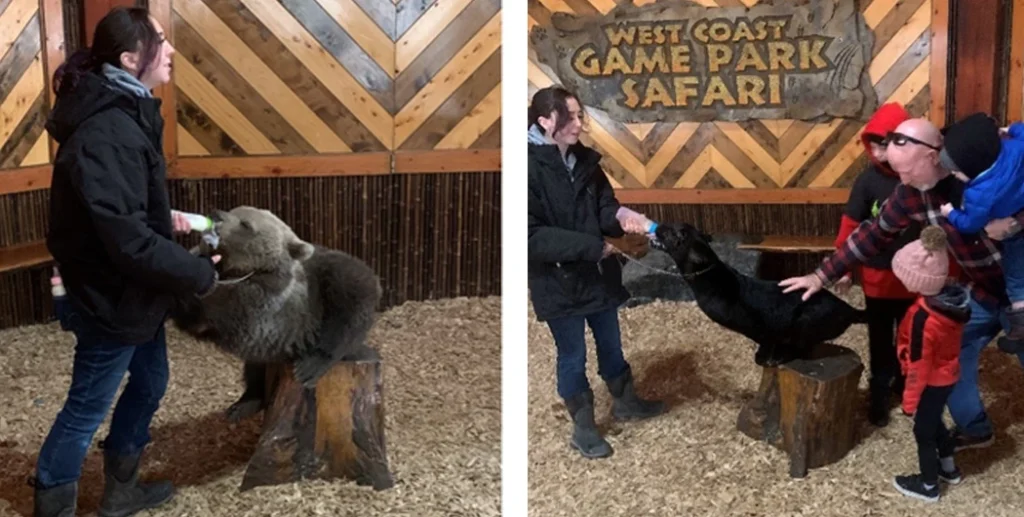BANDON, Ore. — Animal Wellness Action is applauding the Oregon State Police and partnering agencies for shuttering the West Coast Game Park Safari in Bandon and seizing approximately 300 animals housed there and placing them in safe settings. Animal Wellness Action and Big Cat Rescue conducted an investigation of the facility in 2022 and reported findings to state and federal authorities. The roadside zoo has been cited repeatedly by federal regulators for violating the Animal Welfare Act, but USDA has taken only the most modest enforcement actions, leaving it up to authorities to take action.
“The West Coast Game Park Safari has been infamous in animal welfare circles for years, and it’s a great relief that this substandard operation will not continue to put animals at risk,” said Wayne Pacelle, president of the Center for a Humane Economy and Animal Wellness Action.

The U.S. Department of Agriculture (USDA) cited the park 78 times in the past year alone for noncompliance with animal welfare regulations. According to an April USDA inspection report, two lions and a leopard were found with “hips, ribs, and spine[s] prominently displayed under the skin,” indicating severe undernourishment. The facility’s veterinarian admitted he had not been asked to examine the animals.
In December, inspectors found a coatimundi, a small South American mammal, reluctant to leave its enclosure. By the following month, the animal was dead. No veterinarian had examined it, and necropsy was not performed. Investigators also reported that several animals, including two wallabies, had disappeared without documentation of sale or death. That said, USDA and other federal authorities took little practical action to turn around the problems.
An investigator with Animal Wellness Action, responding to tips from the public, conducted an undercover visit to the zoo in January 2023. “I witnessed numerous members of the public, including small children, interacting with a juvenile jaguar and a Syrian brown bear,” said the investigator, who remains anonymous due to the undercover role. “That kind of behavior puts visitors and animals at risk unnecessarily.”
The investigator documented clear violations of federal law restricting public contact with dangerous captive carnivores. The visit also revealed that two bears, a lynx, two lions, a serval, a full-grown black jaguar, and two chimpanzees were confined in small, unclean enclosures and exhibiting signs of psychological distress.
“The bears and cats were pacing constantly in their cramped, filthy cages,” the investigator said. “The chimpanzees were rocking back and forth—classic signs of emotional distress and boredom. None of the enclosures had adequate water.”
Animal Wellness Action, in partnership with Big Cat Rescue, submitted its findings to both state and federal authorities.
“We are relieved to see that action has finally been taken to end the years of suffering at this horrible roadside zoo,” said Howard Baskin, advisory board chairman at Big Cat Rescue. “The sad part is that based on eyewitness accounts from visitors, we began filing complaints of mistreatment of the animals there to federal agencies charged enforcing animal protection laws in 2012, did so repeatedly for over a decade, and only now, after years of suffering and death, has this come to an end. The moral of this story is we need stronger laws and a section dedicated to animal law enforcement at the U.S. Department of Justice like we have for other specialized areas of enforcement that require focus and expertise.”
“This is a stark reminder for people to look for facilities accredited by the Association of Zoos and Aquariums to ensure your visit reflects excellence in animal care and wellbeing, and quality guest experiences,” said Dan Ashe, president and CEO of the Association of Zoos and Aquariums. “AZA-accredited members like Oregon Zoo, Oregon Coast Aquarium, and Wildlife Safari hold themselves to the global gold standard for modern zoos and aquariums. We’d like to express our gratitude to the Oregon State Police and the state and local entities who took action to shut down West Coast Game Park Safari. We are also grateful to the facilities who are taking in the rescued animals in their time of need, simply because it is the right thing to do.”
“As a southern Oregon resident, I am horrified by what goes on at this roadside zoo,” said Tamara Drake, director of research and regulatory policy at the Center for a Humane Economy. “The public has called for its closure for years because of long-standing neglect and substandard animal care. We commend the Oregon State Police for taking decisive action to end the mistreatment.”
Drake also expressed concern for George, the facility’s last surviving chimpanzee, after the death of his companion, Daphne, in 2023.
“My heart breaks for George,” Drake said. “Chimpanzees in the wild are highly intelligent, social animals who travel in groups, solve problems, and form strong bonds. When those needs go unmet—as in labs or roadside zoos—they often exhibit abnormal, repetitive behaviors to cope with stress.”
The USDA cited the park for failing to update George’s enrichment plan after Daphne’s death. Inspectors noted George was frequently observed facing the wall of his enclosure and not displaying typical chimpanzee behaviors, signs consistent with psychological distress.

